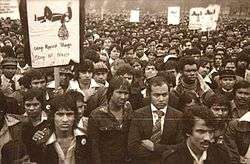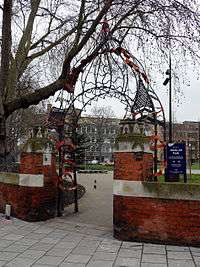Altab Ali
| Altab Ali | |
|---|---|
| Born |
1953 Sylhet District, Sylhet Division, East Bengal (now Bangladesh) |
| Died |
4 May 1978 (aged 25) Whitechapel, Tower Hamlets, London, England |
| Resting place | Tower Hamlets, London, England |
| Nationality | Bangladeshi |
Altab Ali (1953 – 4 May 1978) was a Bangladeshi textile worker who was murdered by three teenagers on 4 May 1978 in a racist attack as he walked home after work. His murder took place at St. Mary's Gardens by St Mary's Churchyard, and near the corner of Adler Street and Whitechapel Road in London. It provoked the mass mobilisation of the Bengali community locally and came to represent the self-organisation of the community. Ali became a symbol of resistance against racism and is associated with the struggle for human rights in defence of British Bangladeshis. The churchyard he was murdered in was later renamed Altab Ali Park in his memory.
Background
Ali was a 25-year-old mechanic who had recently arrived[1] from Sylhet District, Sylhet Division,[2] East Bengal (now Bangladesh) and lived in the East End of London.[3]
Death
On 4 May 1978, on local borough election night and against a background of agitation by National Front,[1] Ali was making his way to the bus stop after finishing work[4] as a textile[5] factory[6] garment worker at a sweatshop in Brick Lane.[1] He was chased along Brick Lane and stabbed to death near Aldgate Station[7] in a racially motivated attack[8] at St. Mary's Gardens, the site of the church of St Mary Matfelon[9] by St Mary's Churchyard, and the corner of Adler Street and Whitechapel Road.[3][10]
Out of the three attackers, two were white and one was black.[1] Ali's killers were Roy Arnold (aged 17) of Limehouse, Carl Ludlow (aged 17) of Bow and an unnamed mixed race male from Poplar (aged 16). It was the 16-year-old who committed the stabbing and when police asked him why, his reply was "for no reason at all". He stated, "If we saw a Paki we used to have a go at them. We would ask for money and beat them up. I've beaten up Pakis on at least five occasions."[4]
Aftermath

At the time, right-wing extremism was on the rise in east London, with the National Front standing for election in 43 council seats.[11] Ali's murder mobilised the Bangladeshi community. Demonstrations were held in the area of Brick Lane against the National Front.[9]
On 14 May 1978, 7,000 people took part in a demonstration against racial violence and marching behind Altab Ali's coffin from Adler Street, where Ali died, to Hyde Park, Trafalgar Square and Downing Street, to demand police protection for the Bengali community and to protest against the National Front and its campaign.[11][12][13][14][15] It was described at the time as "one of the biggest demonstrations by Asians ever seen in Britain".[4]
The murder provoked a mass mobilisation of the Bengali community locally[6] The protest against the murder politicised a generation of young Bengali activists[6] and many any Bangladeshis were drawn into political activity in the aftermath of the murder.[16] This began a movement that eventually pushed the National Front out of Whitechapel, and helped affirm Bengali identity there.[11]

The name Altab Ali became a widely known symbol of resistance against racism generally and is associated with the struggle for human rights specifically in defence of the Bangladeshis in the UK after Bengali the community mobilised in May 1978 to defend itself against racist attacks that were represented in the murder of Altab Ali.[3] As a response to persistent racial tension, residents began to organise neighbourhood committees and youth groups.[2] His murder was the trigger for the first significant political organisation against racism by Bangladeshis.[3]
Altab Ali Foundation was later set up which holds the annual commemoration to all victims of racism, staged in the former St Mary's Churchyard that was renamed Altab Ali Park[17] by Tower Hamlets Council in 1979.[9] Altab Ali Foundation soon became a movement against racism around the East End of London. The campaign against racism that took place after Ali's murder influenced the identification and association of the collective social and community image of British Bangladeshis in Tower Hamlets.[3]
Every year since Ali's death an annual commemoration has taken place in Whitechapel in his memory.[17][18]
See also
References
- 1 2 3 4 Chakraborty, Mridula Nath (2014). Being Bengali: At Home and in the World. Routledge. p. 178. ISBN 978-0415625883.
- 1 2 Tatari, Eren (2015). Muslims in British Local Government: Representing Minority Interests in Hackney, Newham, and Tower Hamlets. Brill Academic Publishers. p. 116. ISBN 978-9004269699.
- 1 2 3 4 5 "Indymedia: Altab Ali". Indymedia. Retrieved 19 September 2007.
- 1 2 3 Kibria, Nazli (2011). Muslims in Motion: Islam and National Identity in the Bangladeshi Diaspora. Rutgers University Press. p. 86. ISBN 978-0-8135-5056-5.
- ↑ Rashid, Harounor (1 May 2014). "May Day: Linking workers from east London to Bangladesh". London: Morning Star. Retrieved 1 December 2015.
- 1 2 3 Gilman, Sander L. (2014). Judaism, Christianity, and Islam: Collaboration and Conflict in the Age of Diaspora. Hong Kong University Press. p. 171. ISBN 978-988-8208-27-2.
- ↑ Glinert, Ed (2006). East End Chronicles. Penguin. p. 268. ISBN 978-0-14-101718-1.
- ↑ Troyna, Barry; Carrington, Bruce (1990). Education, Racism and Reform. Taylor & Francis. p. 30. ISBN 978-0-415-03826-3.
- 1 2 3 Keith, Michael (2005). After the Cosmopolitan?: Multicultural Cities and the Future of Racism. Routledge. p. 144. ISBN 978-0-415-34169-1.
- ↑ "Bangladeshi London". Exploring 20th century London. Retrieved 1 November 2015.
- 1 2 3 "New park life: Whitechapel's Altab Ali Park". London: London Evening Standard. 16 November 2011. Retrieved 1 November 2015.
- ↑ Sandhu, Sukhdev (9 October 2003). "Come hungry, leave edgy". 25 (19). London: London Review of Books. pp. 10–13. Retrieved 19 September 2007.
- ↑ Panayi, Panikos (1996). Racial violence in Britain in the nineteenth and twentieth centuries. Leicester University Press. p. 200. ISBN 978-0-7185-1397-9.
- ↑ Leech, Kenneth (1988). Struggle in Babylon. Sheldon. p. 86. ISBN 978-0-85969-577-0.
- ↑ Bowling, Benjamin (1988). Violent Racism: Victimization, Policing, and Social Context. Clarendon Press. p. 48. ISBN 978-0-19-826252-7.
- ↑ German, Lindsey; Rees, John (2012). A People's History of London. Verso Books. p. 248. ISBN 978-1-84467-855-6.
- 1 2 Brooke, Mike (6 May 2015). "Altab Ali's racist murder in Whitechapel remembered 37 years on". London: East London Advertiser. Retrieved 1 November 2015.
- ↑ Barnett, Adam (7 May 2014). "Anti-racists and Bangladeshis mark Altab Ali Day in Whitechapel". London: East London Advertiser. Retrieved 1 November 2015.